Hundreds of Indian and Chinese troops are locked into a standoff over border disputes in the contested Chumar region of Ladakh, on the Sino-Indian, or Tibetan, border.
This follows reports by Indian military officials of a Chinese incursion into Indian territory during Chinese President Xi Jinping’s visit to India last week. During talks, Xi promised Chinese investment of $20 billion in India over the next five years, however strengthening of commercial ties was overshadowed by the border dispute.
The Times of India reported Prime Minister Modi telling President Xi, “Even such small incidents can impact the biggest of relationships, just as a little toothache can paralyse the entire body.”
Following talks between the two premiers, troops have withdrawn from face-to-face confrontation. Currently, India has deployed around 1,500 troops to the region and China around 800 although they are separated from each other, an Indian government official said.
The Chinese Ministry of Defence said in a faxed statement, that “the two countries’ border, to this day, has not been designated.” It added, “both sides, if problems occur in the border area, can reach an appropriate resolution through dialogue and consultation.”
The third of a series of flag meetings was held on September 25 to negotiate a resolution to the situation after the first two proved unproductive. During this meeting, India is reported to have raised the demand for a restoration of a “pre-September 10” situation.
This follows reports of Chinese incursions in the area in early September. Sources stated that from September 5, the Chinese army refused to allow work to continue on construction work on a water supply project by the Leh District Administration at T-point in the Demchok area, 300 km from Leh.
Indian development plans for this contested border area, including the construction of some 6,000km of roads, are explicitly territorially focused. Environment Minister Prakash Javadekar described projects as “about defence preparedness.”
“On the Chinese side of the border, not only have they built good roads, they are building up their railway network. Our army faces problems because of the bad quality of roads,” he added.





 Print
Print Email
Email